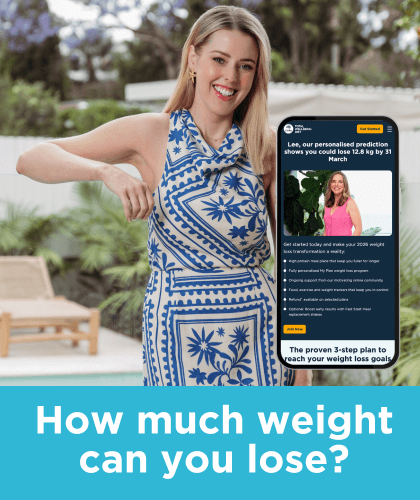4 simple rules to lose weight

Dieting but not losing weight? You may have been given bad advice. Instead try following our 4 simple food rules to speed up your weight loss efforts.
In earlier blog posts, we’ve uncovered popular meal-time myths and explored common fad dietary advice that can do more harm than good. But what are some fast and easy rules to help accelerate your weight loss?
Our most successful members follow these 4 golden rules that are not only based on science, but are practical and deliciously healthy enough to follow.
1. You don’t need to deprive yourself
Cutting out food groups or dramatically reducing the kilojoules you eat will only leave you hungry, making it hard to stick to your diet in the long run.
An effective and healthier approach to weight loss is eating a variety of foods from all food groups in moderation. Unfortunately, many dieters skip essential food groups, such as bread and cereals or dairy, which in reality are some of the most important type of foods in a weight loss plan.
With the Total Wellbeing Diet, eating according to food groups is key – meals should include lean protein, such as salmon or chicken, paired with low GI carbohydrates and plenty of fresh vegetables. And, unlike many other diets, you can still lose weight and enjoy the occasional piece of chocolate, choc-chip cookie or scoop of ice-cream with our list of indulgences.
2. Weight loss doesn’t happen overnight – it takes time
Unless you have all the time to be in the kitchen while hitting the gym every day, weight loss will take some time. Consistency and preparation is key here.
The reason why successful dieters don’t drop out in the first few weeks of the Total Wellbeing Diet is because they stick to their meal plan and prepare ahead. Leaving no room to feel hungry means you’re less likely to opt for takeaway or the local restaurant because you’re satiated from all the balanced meals Total Wellbeing Diet offers.
And while there is a set meal plan to follow, the Total Wellbeing Diet is flexible. You can swap out a prescribed meal for one that suits a special occasion or your mood (the 12-week program includes over 1,000 recipes).
3. Fat is your friend
A common mistake people make is cutting out fat on the belief that the less fat you eat the more body fat you’ll lose.
More and more research is suggesting that low fat diets can actually make it harder to lose weight. This is because fat is needed for satiety, healthy metabolism, and low fat alternatives can be filled with sugar and high-kilojoule additives to make it taste better.
This isn’t the case with The Total Wellbeing Diet as our menu plans are built on the idea that healthy, wholefood fats such as avocados, nuts and olive oil are part of a balanced diet.
Fats that will hamper your weight loss efforts, on the other hand, include fats from butter, cream and fatty cuts of meat that provide excess kilojoules and can increase your blood cholesterol levels.
4. Real, everyday food is key
Supplements and detoxes are unlikely to result in long-term weight loss. Similar to cutting out food groups or kilojoules, the main problem is that these type of diets are too hard to maintain. You may also be missing out on essential nutrients, typically fats and protein, that the body needs to perform at its best.
A supplement or detox plan may also leave you tired and low on energy, causing you to crave high-fat and high-sugar foods. Learn more about a healthy diet and how to lose weight sensibly with the CSIRO Total Wellbeing Diet.
